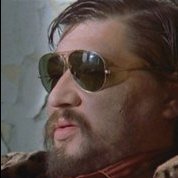-
Content count
1303 -
Joined
-
Last visited
-
Days Won
1
Posts posted by Dale Cooper Black
-
-
I'm starting to realize (especially while watching the new incarnation of Twin Peaks) that there are actually two very distinct David Lynches: David Lynch the nightmare surrealist, and David Lynch the folksy raconteur. Every Lynch project has some combination of the two, thus making it easy to mistake the mixture for a single, unified vision--but these two David Lynches are actually circling each other in an uneasy truce, constantly vying to be the definitive Lynchian voice.
By my way of thinking, the apogee of "Nightmare Lynch" would be Eraserhead, while the apogee of "Folksy Lynch" would be The Straight Story. But if we want a truly representative David Lynch film for the Canon, we need something a little closer to the middle. Love it or hate it, Blue Velvet strikes a relatively palatable balance between the two.
I think you could also argue that if it weren't for Blue Velvet, Lynch might have wound up as a dimly-remembered cult figure. Dune was a massive failure, and Lynch could have easily gone the way of Michael Cimino after Heaven's Gate, watching his influence as a filmmaker dwindle as he faded into obscurity. Instead, Lynch dug even deeper into his own psyche and gave us Blue Velvet, which paved the way for Twin Peaks, which in turn unleashed Lynch on the wider cultural landscape.
I actually enjoy watching Eraserhead more than Blue Velvet (by a wide margin). But in the grand scheme of things, Eraserhead is a very cool sketch that shows a lot of promise, while Blue Velvet is a fully realized painting.
-
 6
6
-
-
I don't see much connections besides being epic in length and the subject matter of crime as a society-shaping force.
That was pretty much the extent of my thinking. I was just trying to come up with another epic-length gangster film that hadn't been submitted to the Canon yet, and OUATIA was the first one that popped into my head.
Upon further reflection, though, it occurred to me that there are some interesting structural similarities. Both movies begin by throwing the audience into the middle of a chase scene, which then segues into a flashback (as per the lead character's reminiscence) that introduces the protaganists as poverty-stricken street kids. We then follow the kids as they grow into adults, and watch their relationships evolve as they become more deeply enmeshed in gang culture, before eventually circling back to that opening sequence.
Of course, these are superficial similarities, and the two lead characters (Rocket and Noodles) couldn't be less similar in their respective paths. But I think both films are worthy of consideration, and it would be fun to see them square off against each other.
-
 1
1
-
-
-
-
That shower curtain might be a write-off, though
-
I warned him not to do his own stunts
-
In addition to positive energy, I will also be sending out invisible unicorns
-
-
-
-
-
-
-
-
-
Bump. In addition to being truly great, this movie is still relatively unknown. That needs to change.
Maybe pair it up against another sprawling epic. City of God vs. Once Upon a Time in America?
-
Thanks for submitting this to the Canon!
I was "lucky" enough to see the longer version of this film many years ago, at the end of a week-long film festival. A friend and I had committed to watching every single film on the program, so by the final evening we were already exhausted and somewhat punch drunk. At that point, pretty much any movie would have been a chore to sit through, so it was with some trepidation that we walked into the midnight screening of Female Trouble.
As I said, this was many years ago, but I still remember it as if it were yesterday. Watching Female Trouble is like being trapped in a cage with a drunken chimpanzee: Kind of amusing at times, but after awhile you'll be begging to be let out. I truly believe this movie might be a violation of the Geneva Conventions.
Female Trouble would be a difficult movie to sit through at the best of times, but watching it in an already-exhausted state of mind is tantamount to mental torture. But I had never walked out of a movie before, and I was determined to sit through the entire screening. As the movie appeared to be nearing its end, I was proud of my accomplishment. Soon I will be free of this madness, I thought.
And then it happened.
Dawn Davenport, having been arrested for her crimes, is put on trial. And we, the audience, get to relive the ENTIRE MOVIE through the verbal testimony of the witnesses, including Dawn herself.
The decision to include this scene is the single most cruel decision ever made by a filmmaker, and for that reason alone it deserves a place in the Canon.
-
 1
1
-
-
-
I have been corn-verted by Colfax
-
-
While you're at it, ask if they've got Frenchfries
-
-
-



Episode 105 - Eraserhead vs. Blue Velvet (w/ Michael Nordine)
in The Canon
Posted
Isn't it astounding? At the risk of derailing this thread (something we were specifically warned not to do!), I really believe we are witnessing the quintessential David Lynch masterpiece unfold.